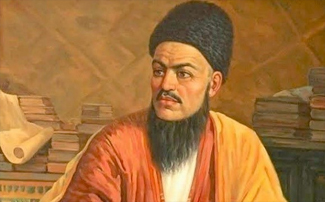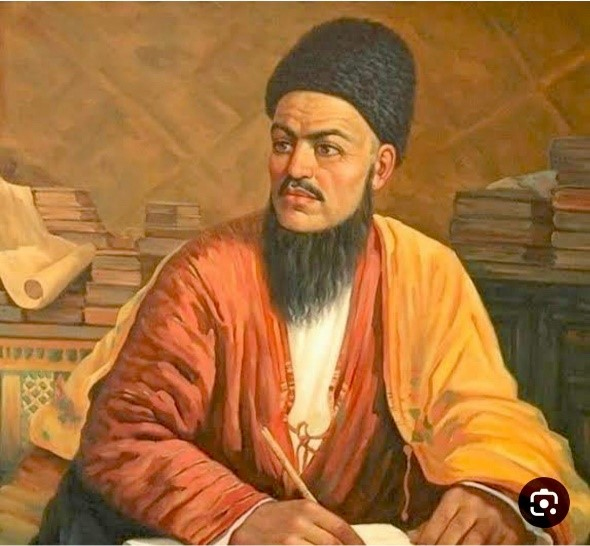
Makhtumkuli Fraghi – one of the great Eastern poets, fighter for human rights and freedom (1724-1807) Mr. Habib Zalmai, Researcher, Member of the Global Jurists Association of Afghanistan
Makhtumkuli Fraghi was a talented poet, master of speech, a famous researcher and representative of classical Turkmen literature.
He played a significant role not only in the development of the language and literature of the Turkmen people or entire Turkic nations, but also in the development and progress of Eastern literature.
His father, Dovletmammet Azadi, was one of the famous scientists and a great religious figure, master, and poet of his time.
Makhtumkuli was brought up in a large family with his siblings and loving mother named Arazgul.
Makhtumkuli Fraghi received his primary education from his father Dovletmammet Azadi. Due to the focused efforts of his father and the personal talent possessed by the poet himself, he was able to rise to the pinnacle of fame in a short period of time.
Makhtumkuli was a lover of science and knowledge, strived for education and improvement of his mystical worldview. As a young man he was enrolled in a school (Shirgazi) in Khiva for three years, and afterward he was enrolled in the Gogeldash school in Bukhara.
Bukhara at that period was one of the centres of science, culture and cradle of civilization, where students from different parts of Central Asia came to study in search of knowledge and science.
The social and military situation during Makhtumkuli Fraghi’s lifetime is ambiguous. The years of his life coincide with the period of major social, military, and economic crises. An insecure region without a stable government, each region has its own emir and khan, each region has its own rules and regulations that are different from each other. Makhtumkuli traveled frequently throughout what is now Iran, Afghanistan, India, Azerbaijan, and others.
It is well known that a poet or writer can create a truly valuable literary work only when he himself has experienced the joys and sufferings of this life, seen ugliness and beauty, wealth and poverty, glory and dishonour.
Makhtumkuli Fraghi devoted all his literary and mystical work to his people. The period of the poet’s life and the social situation of that time strengthened him, so he always strived to reflect in his mystical poems the national unity, courage and steadfastness against oppressors, unity and empathy, friendship and closeness between people. According to him, unity and cohesion of people was the only way to survive and win.
Makhtumkuli Fraghi was also very interested in the works of great literary figures, clergy and Sufism.
He wrote about such outstanding personalities as Abu Saeed Abul Khair, Khoja Yusuf Hamadani, Omar Khayyam, Nizami Ganjavi, Hafez Shirazi, Saadi Shirazi, Jalaleddin Balkhi, Mahmud Pahlavon, Naqshbandi, Abdul Rahman Jami, Alisher Navoi and others.
Makhtumkuli took a special interest in the teachings and thoughts of famous philosophers, such as Plato and Galen. Studying them, he gave philosophical meaning to his poems as well.
His works cover all issues related to the life of Turkmens of that period. Makhtumkuli’s poems gather all Turkmens around the table and illustrate the concept of unity and integrity. And this is one of the main reasons that the works of Makhtumkuli Fraghi are very valuable and occupy a special place in the hearts of Turkmens.
Makhtumkuli was a poet capable of expressing pain, suffering and sorrow.
His elder brother Abdullah was part of an embassy to the powerful ruler Ahmed Shah with a call for unity and solidarity, but unfortunately, he lost on the way.
The untimely death of his brother was another tragedy for Makhtumkuli. Later he would reflect this pain in his poems:
Nine years we’ve been apart from you, brother;
Where have you found your homeland, my Abdullah?
There’s no turning back for you;
Where have you found your home, my Abdullah?
The philosophy of law in Makhtumkuli’s poems is based on the logic of methods, the way of analysing and interpreting legal principles and requirements such as justice, righteousness, the concepts of oppressor and oppressed, right and wrong, the order of war and peace, etc.
Makhtumkuli and his father Dovletmammet Azadi were fluent in jurisprudence, its analysis and interpretation. At that time, they had a prominent voice in the field of high thoughts of justice, considering the mass culture and customs of the people.
Every nation is ruled by customs and traditions that have a great influence on ensuring social order and peace: respect for elders, kindness to children and dozens of others. In Eastern culture, customs, traditions and foundations are law. In this regard, the correct meaning of legal rules cannot be understood without considering social customs. This theme was also privately reflected in the poet’s poems.
Makhtumkuli Fraghi was a poet who worked tirelessly to solve social problems. He was a defender of the oppressed.
In Makhtumkuli’s poems, wise words and proverbs follow each other like shining pearls. He is a convinced mystic and public figure who sees his mission in enlightening the people for the unity and integrity of his nation, fighting against oppressors.
Among other high concepts reflected in Makhtumkuli’s poems are attention to moral virtues, altruism, sorrow and practical wisdom, which turned the works of this famous poet and mystic into a treasury of the nation. He succeeded in expressing the social problems of his time in the beautiful language of poetry, and these popular poems were the reason for his permanence and immortality in the public mind.
Another feature of Makhtumkuli Fraghi’s poems is their simplicity and easy of understanding, i.e. the absence of terms and words from other languages.
Throughout his life, as a poet and mystic, he gave his whole soul to his people and homeland, speaking about the realities of his time with people like him.
Today, more than ever, society needs individuals who live high thoughts of peace, unity and empathy.
Marking the birth anniversary of this great poet, we are essentially pay tribute to the values of peace and unity.






